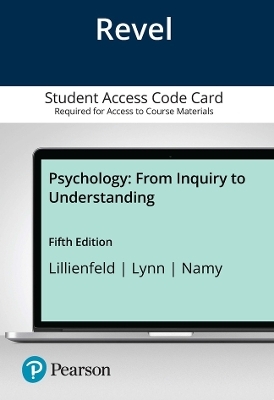
New MyLab Psychology without Pearson eText -- Standalone Access Code Card -- for Discovering the Life Span
Pearson (Hersteller)
978-0-205-98249-3 (ISBN)
- Titel ist leider vergriffen;
keine Neuauflage - Artikel merken
Packages
Access codes for Pearson's MyLab & Mastering products may not be included when purchasing or renting from companies other than Pearson; check with the seller before completing your purchase.
Used or rental books
If you rent or purchase a used book with an access code, the access code may have been redeemed previously and you may have to purchase a new access code.
Access codes
Access codes that are purchased from sellers other than Pearson carry a higher risk of being either the wrong ISBN or a previously redeemed code. Check with the seller prior to purchase.
-- Modular, Manageable, Meaningful - help your students discover the life span.
Discovering the Life Span, 3/e by Robert S. Feldman helps students truly connect to the material. Written in an engaging and accessible style and organized in a modular format, this title allows instructors to cover the entire life span without having to sacrifice content throughout their course. Students will get a better sense of the entire process of development and understand how the domains of development work together. Discovering the Life Span is a meaningful learning experience that prepares readers to apply content to their personal and future professional lives.
MyPsychLab is an integral part of the Feldman program. Engaging activities and assessments provide a teaching and learning system that will help students master life span development. New features include the updated MyPsychLab Video Series for Lifespan Development, which contains a rich assortment of video clips including sketchnote-style tutorials as well as cross-cultural footage and segments featuring real students sharing their experiences. MyPsychLab also contains MyVirtualLife, an engaging variable-based simulation that allows students to experience lifespan development firsthand.
This title is available in a variety of formats - digital and print. For the 3rd edition, Pearson is proud to offer a fully interactive eText version of the book that includes rich media and assessment to enliven the learning experience for students. Pearson offers its titles on the devices students love through Pearson's MyLab products, CourseSmart, Amazon, and more. To learn more about pricing options and customization, click the Choices tab.
Robert S. Feldman is Professor of Psychology and Dean of the College of Social and Behavioral Sciences at the University of Massachusetts Amherst. A recipient of the College Distinguished Teacher Award, he teaches psychology classes ranging in size from 15 to nearly 500 students. During the course of more than two decades as a college instructor, he has taught both undergraduate and graduate courses at Mount Holyoke College, Wesleyan University, Virginia Commonwealth University, in addition to the University of Massachusetts. Feldman, who initiated the Minority Mentoring Program at the University of Massachusetts, also has served as a Hewlett Teaching Fellow and Senior Online Teaching Fellow. He initiated distance learning courses in psychology at the University of Massachusetts. Feldman also is actively involved in promoting the field of psychology. He is on the Board of Directors of the Federation of Associations in Behavioral and Brain Sciences (FABBS) and he also is on the Board of the FABBS Foundation A Fellow of both the American Psychological Association and the Association for Psychological Science, Professor Feldman received a B.A. with High Honors from Wesleyan University and an M.S. and Ph.D. from the University of Wisconsin-Madison. Feldman is a winner of a Fulbright Senior Research Scholar and Lecturer award, and he has written more than 150 books, book chapters, and scientific articles. He has edited Development of Nonverbal Behavior in Children (Springer-Verlag), Applications of Nonverbal Behavioral Theory and Research (Erlbaum), and co-edited Fundamentals of Nonverbal Behavior (Cambridge University Press). He is also author of Child Development, Understanding Psychology, and P.O.W.E.R. Learning: Strategies for Success in College and Life. His books have been translated into a number of languages, including Spanish, French, Portuguese, Dutch, Chinese, and Japanese. His research interests include honesty and deception in everyday life and the use of nonverbal behavior in impression management, and his research has been supported by grants from the National Institute of Mental Health and the National Institute on Disabilities and Rehabilitation Research. Feldman loves music, is an enthusiastic, if not-exactly-expert, pianist, and he enjoys cooking and traveling. He has three children, and he and his wife, a psychologist, live in western Massachusetts, in a home overlooking the Holyoke mountain range.
In this Section:
1. Brief Table of Contents
2. Full Table of Contents
1. Brief Table of Contents:
Chapter 1: Introduction
Chapter 2: The Start of Life
Chapter 3: Infancy
Chapter 4: The Preschool Years
Chapter 5: Middle Childhood
Chapter 6: Adolescence
Chapter 7: Early Adulthood
Chapter 8: Middle Adulthood
Chapter 9: Late Adulthood
Chapter 10: Death and Dying
2. Full Table of Contents:
Chapter 1: Introduction
Module 1.1 Beginnings
Module 1.2 Theoretical Perspectives on Lifespan Development
Module 1.3 Research Methods
Chapter 2: The Start of Life
Module 2.1 Prenatal Development
Module 2.2 Prenatal Growth and Change
Module 2.3 Birth and the Newborn Infant
Chapter 3: Infancy
Module 3.1 Physical Development in Infancy
Module 3.2 Cognitive Development in Infancy
Module 3.3 Social and Personality Development in Infancy
Chapter 4: The Preschool Years
Module 4.1 Physical Development in the Preschool Years
Module 4.2 Cognitive Development in the Preschool Years
Module 4.3 Social and Personality Development in the Preschool Years
Chapter 5: Middle Childhood
Module 5.1 Physical Development in Middle Childhood
Module 5.2 Cognitive Development in Middle Childhood
Module 5.3 Social and Personality Development in Middle Childhood
Chapter 6: Adolescence
Module 6.1 Physical Development in Adolescence
Module 6.2 Cognitive Development in Adolescence
Module 6.3 Social and Personality Development in Adolescence
Chapter 7: Early Adulthood
Module 7.1 Physical Development in Early Adulthood
Module 7.2 Cognitive Development in Early Adulthood
Module 7.3 Social and Personality Development in Early Adulthood
Chapter 8: Middle Adulthood
Module 8.1 Physical Development in Middle Adulthood
Module 8.2 Cognitive Development in Middle Adulthood
Module 8.3 Social and Personality Development in Middle Adulthood
Chapter 9: Late Adulthood
Module 9.1 Physical Development in Late Adulthood
Module 9.2 Cognitive Development in Late Adulthood
Module 9.3 Social and Personality Development in Late Adulthood
Chapter 10: Death and Dying
Module 10.1 Dying and Death Across the Life Span
Module 10.2 Confronting Death
Module 10.3 Grief and Bereavement
| Erscheint lt. Verlag | 6.8.2014 |
|---|---|
| Sprache | englisch |
| Gewicht | 68 g |
| Themenwelt | Geisteswissenschaften ► Psychologie |
| ISBN-10 | 0-205-98249-2 / 0205982492 |
| ISBN-13 | 978-0-205-98249-3 / 9780205982493 |
| Zustand | Neuware |
| Haben Sie eine Frage zum Produkt? |
aus dem Bereich

